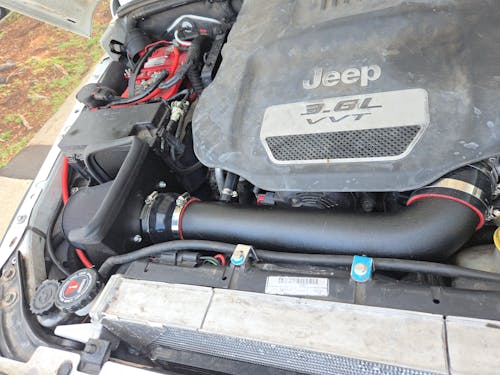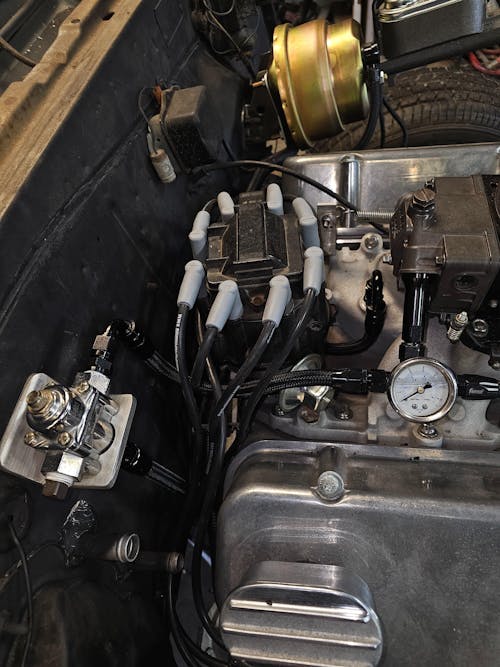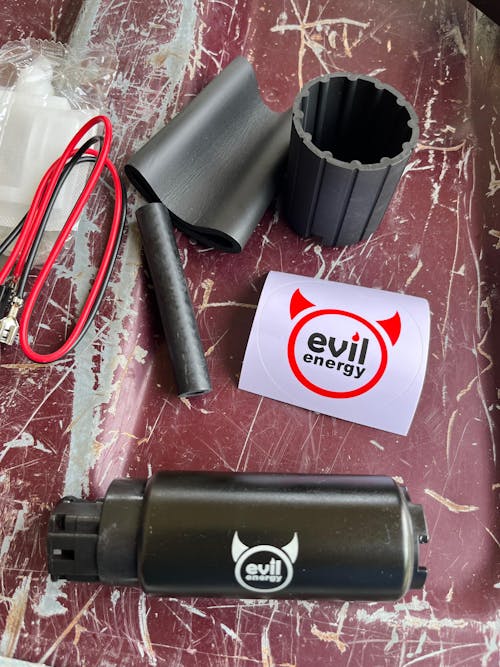Holley VS EVIL ENERGY: Which 350 CFM Carburetor Is the Best Carburetor for a 350 Chevy?
Looking for the best 2-barrel carburetor for Chevy 350 performance? This in-depth review pits the industry standard Holley 350 CFM Carburetor against the value-driven EVIL ENERGY 350 CFM 2-Barrel Carburetor. We compare features, tunability, price, and overall quality to help you decide which high-performance carburetor delivers the most power and reliability for your small block.
Why 350 CFM 2-Barrel Carburetors Matter for Chevy 350 and Classic Engines
When people talk about the Chevy 350, classic American muscle cars, or small-block V8 engines, the first upgrade they often think of is not turbocharging or EFI. Instead, it is a 2-barrel carburetor. It is simple in structure, reliable in performance, and still plays a key role in many classic engines.
The 350 CFM 2-barrel carburetor is considered one of the most practical and balanced choices for these engines. The airflow matches the Chevy 350 very well. It provides smooth power for daily driving and enough response for light performance builds or street use.
This type of carburetor keeps what many classic car owners love — mechanical feel, easy maintenance, and stable performance. It does not complicate the vehicle like turbo systems or electronic fuel injection.
In short, if you drive a Chevy 350 or another small-block V8 and you want reliability, good throttle response, and a true old-school driving experience — not extreme horsepower — then a 350 CFM 2-barrel carburetor is a smart and worthwhile upgrade.

Why Is It a Good Match for the Chevy 350 and Classic Engines?
The 350 CFM 2-barrel carburetor is a great fit for the Chevy 350 and other small-block V8 engines because its airflow matches the engine’s displacement very well. It delivers enough air and fuel without causing issues like running too rich or too lean.
This type of carburetor is especially popular in:
-
Chevy 350 and 350 Small-Block V8 engines
-
Classic American muscle cars, such as Camaro, Chevelle, and C10 trucks
-
Street Rod builds
-
Mild performance upgrades
-
Classic vehicles that keep a carburetor instead of switching to EFI
In simple terms, if you want smooth engine starts, stable idling, quick throttle response, and that original old-school driving feel, a 350 CFM 2-barrel carburetor is a reliable and uncomplicated choice.
What This Article Will Compare
To help you choose the right 2-barrel carburetor, this article focuses on two of the most popular comparison groups on the market.
-
Holley 0-80350 vs EVIL ENERGY 350-CFM 2-Barrel Performance Carburetor
Designed for drivers who want better performance, street use, and mild upgrades.
-
Holley 0-7448SA vs EVIL ENERGY 350-CFM 2-Barrel Carburetor
Better suited for daily driving, classic car restoration, and users who want stable fuel delivery.
The comparison will cover key factors such as:
-
Performance and throttle response
-
Ease of installation
-
Price and value
-
Tuning flexibility
-
Fitment and compatibility with Chevy 350 and similar engines
This way, readers can quickly see which carburetor fits their engine, budget, and driving needs.
What is a 2-barrel carburetor?
A 2-barrel carburetor (often called a 2bbl carburetor) is a type of carburetor that uses two barrels or a venturi to mix air and fuel before sending it into the engine. Think of it as the “lungs” of older engines — it controls how much air and fuel the engine breathes in, which directly affects how smoothly the car runs.
Why is it called '2 barrel'?
It gets this name because it has two openings (barrels) instead of just one. These two barrels pull in air and fuel and feed the engine more efficiently than a single-barrel carburetor, but with less fuel demand than a 4-barrel carburetor.
How Does a 2 Barrel Carburetor Work?
-
When you press the gas pedal, the carburetor opens its throttle plates.
-
Air flows through the two barrels, creating a vacuum.
-
This vacuum pulls fuel from the bowl and mixes it with air.
-
The air-fuel mixture then goes into the engine’s cylinders for combustion.
It’s a mechanical system — no electronics, no sensors. Simple, reliable, and easy to repair or tune, which is why it’s still popular in classic cars and older V8 engines like the Chevy 350.
Why Do People Still Use 2 Barrel Carburetors?
A 2-barrel carburetor is still widely used because it offers a great balance between fuel efficiency and performance. It is especially common in:
-
Chevy 350 engines and small-block V8S
-
Classic American muscle cars (Camaro, Chevelle, C10 trucks)
-
Street rods and mild performance builds
-
Restorations that want to keep the original carburetor setup
-
Drivers who want smooth idle, reliable starts, and easy maintenance
Compared to a 4 barrel carburetor, a 2 barrel carburetor uses less fuel and is easier to tune. Compared to electronic fuel injection (EFI), it keeps that original mechanical feel that classic car lovers enjoy.
What does 350 CFM mean, and which engines does it fit?
What does 350 CFM mean?
CFM stands for Cubic Feet per Minute. It tells you how much air the carburetor can flow into the engine every minute.
So, when you see '350 CFM carburetor', it means the carburetor can move 350 cubic feet of air per minute. The higher the CFM number, the more air the engine can get, and the more power it can make — but only if the engine is big enough to use that airflow.
Why does CFM matter?
-
Too low CFM = engine can’t breathe well → weak power.
-
Too high CFM = too much air and fuel → poor throttle response, wasted fuel.
-
350 CFM is a middle ground — ideal for mild performance, classic cars, and small-block V8 engines.
Which engine does a 350 CFM carburetor fit?
A 350 CFM 2-barrel carburetor is commonly used on:
| Engine / Vehicle Type | Fitment |
|---|---|
| Chevy 350 Small-Block V8 | Yes — one of the most popular matches |
| 305 Chevy Small-Block | Yes — works well for stock or mild builds |
| 302 Ford Small-Block (older models) | Yes — especially in classic Mustangs and trucks |
| Classic American V8 engines (4.3L–5.7L) | Yes — if lightly tuned or stock |
| Straight-six engines (e.g., 250/292 Chevy I6) | Yes — common upgrade |
| High-performance or racing engines | No — usually need 500+ CFM or 4-barrel carburetors |
| Modern EFI engines | No — fuel injection replaces carburetors |
Why Choose the 350 CFM 2-barrel Carburetor
Choosing a 350 CFM 2-barrel carburetor is a smart decision for anyone running a Chevy 350, small-block V8, or classic American engine that is mostly stock or mildly upgraded. It delivers the right balance of airflow, fuel efficiency, and drivability—without the complexity of larger 4-barrel systems or electronic fuel injection.
-
Perfect Airflow for Stock and Mild Engines
350 CFM (Cubic Feet per Minute) provides enough air for engines in the 4.3L to 5.7L range, especially the Chevy 350.
It prevents the engine from running too rich or too lean and keeps power delivery smooth in daily driving and low to mid RPM ranges.
-
Ideal for Classic Cars and Street Use
Many classic muscle cars and street rods don’t need high horsepower or race-level upgrades. What they need is:
-
Smooth idle
-
Easy cold starts
-
Good throttle response
-
Reliable power for city and highway driving
The 350 CFM 2-barrel carburetor offers exactly that without overfueling or wasting gas.
-
Simple, Mechanical, and Easy to Maintain
Unlike EFI (Electronic Fuel Injection), a 2-barrel carburetor uses no sensors or computer control. It is:
-
Easy to tune with basic tools
-
Affordable to repair or rebuild
-
A great choice for beginners and DIY mechanics
-
Keeps the Original Driving Feel
Many classic car owners prefer the mechanical feel of a carburetor—the sound, the throttle response, and the way the engine breathes.
The 350 CFM 2-barrel keeps that traditional style, especially on vehicles like the Chevy C10, Camaro, Chevelle, and other small-block V8 classics.
-
Cost-Effective Upgrade
Compared to 4-barrel carburetors or EFI conversion kits, a 350 CFM 2-barrel is:
-
Less expensive
-
Easier to install
-
Does not require intake manifold changes or wiring modifications
In Short
You should choose a 350 CFM 2-barrel carburetor if you want:
-
The right airflow for Chevy 350 and similar small-block engines
-
Reliable performance for daily driving or mild performance builds
-
Simple mechanics instead of complex electronics
-
Classic driving feel with stable fuel delivery and easy maintenance
How Do Users View EVIL ENERGY? Can It Really Replace Holley?
On U.S. car forums and Reddit communities like r/carburetors, the question 'Can EVIL ENERGY replace Holley?' is a hot topic. Many users are debating whether to stick with the trusted performance and reputation of Holley or try EVIL ENERGY, a newer brand that offers better value for the price.
The discussions often focus on real-world experiences, including ease of installation, throttle response, and reliability, as well as whether EVIL ENERGY can handle Chevy 350 and small-block V8 engines as effectively as Holley.
What Are the Real Concerns from the Community?
Based on forum discussions, users mainly focus on three key points when debating EVIL ENERGY vs Holley:
-
Build Quality and Durability
-
Many car enthusiasts wonder if EVIL ENERGY can match Holley’s decades-long reputation for reliability.
-
Questions often include whether the materials, throttle linkage, and internal components will hold up over time.
-
Tuning and Performance
-
Users are concerned about how easy it is to adjust the carburetor for a smooth idle, proper fuel mixture, and throttle response.
-
Some fear that EVIL ENERGY may require more trial-and-error tuning compared to Holley, especially on mildly modified or performance engines.
-
Compatibility with Classic Engines
-
Compatibility with Chevy 350, small-block V8S, and other classic American engines is a major concern.
-
Forum users discuss whether EVIL ENERGY can deliver the same balance of fuel efficiency and power without causing running too rich or too lean.
The general consensus on the forums is: 'You can save money, but are you willing to spend more time tuning it?'
Holley vs. EVIL ENERGY: Core Difference Analysis
Holley 0-80350 vs EVIL ENERGY 350-CFM 2-Barrel Performance Carburetor
| Feature | Holley 0-80350 (2300 Series) | EVIL ENERGY 350 CFM 2-Barrel Performance Carburetor |
|---|---|---|
| Brand | Holley | EVIL ENERGY |
| Model | 0-80350 (Holley 2300 Series) | 350 CFM Performance 2-Barrel Carburetor (Replacement for Holley 0-80350) |
| Airflow (CFM) | 350 CFM | 350 CFM |
| Barrels | 2 | 2 |
| Carburetor Flange | 2300 2-BBL (4-hole mounting) | 2-barrel |
| Choke Type | Not clearly specified (Holley 2300 Series offers multiple options) | Electric choke – ensures quicker cold starts in all conditions |
| Secondaries | None | None |
| Fuel Inlet | Single inlet | Single inlet |
| Material / Finish | Aluminum, polished/shiny finish | Aluminum, polished/shiny finish |
| Price | $579.95 | $399.99 (MSRP $419.99 with discount) |
| Warranty | Manufacturer’s Limited Lifetime Warranty | 1-year free warranty, 180-day money-back guarantee |
| Calibration Details | Primary pump nozzle size: 0.028-inch | Main jets: #63; Accelerator pump nozzle: 0.028-inch; Accelerator pump: 30cc; Power valve: 8.5 Hg |
| Other Features | Designed for non-emission-controlled vehicles (1967 & earlier) | Compact 3.25-inch height; 1.5-inch throttle bore; Wet-flow tested; Compatible with GM, Chrysler, Ford A/T kickdown linkage |
Summary & Key Differences
Both products are 350 CFM 2-barrel carburetors designed for street performance upgrades or specific racing applications. However, they differ in pricing, positioning, user experience, and warranty support.
-
Price: EVIL ENERGY offers a significantly lower price — around $180 less than the original Holley model — making it a more budget-friendly option for enthusiasts.
-
Brand Reputation
-
Holley is a long-standing, highly respected brand in the performance and racing industry. The 2300 series is considered an industry standard.
-
EVIL ENERGY positions its product as a cost-effective alternative to the Holley 0-80350, aiming to deliver similar performance specifications at a more accessible price.
-
Choke Type
-
EVIL ENERGY comes with a built-in electric choke, making cold starts quicker and easier in various weather conditions.
-
Holley 0-80350 does not clearly specify the choke type on its product page, and it may require additional confirmation or selection.
-
Warranty & Return Policy
-
Holley offers a limited lifetime warranty, which is a strong advantage in terms of brand trust.
-
EVIL ENERGY provides a 1-year warranty plus a 180-day return policy, allowing customers to try the product with lower commitment and risk.
-
Calibration Details
-
Both carburetors use a 0.028-inch accelerator pump nozzle, meaning basic functionality is similar.
-
EVIL ENERGY provides more detailed factory calibration specs, including #63 main jets and an 8.5Hg power valve, which helps with easier tuning and setup.
If you are pursuing brand reputation, the highest quality, and a lifetime warranty, the Holley 0-80350 is the classic choice. If your budget is limited and you are looking for an economical alternative that claims to have similar specifications and calibration, and features an electric choke, the EVIL ENERGY product is a viable option to consider.
Holley 0-7448SA vs EVIL ENERGY 350-CFM 2-Barrel Carburetor
| Feature | Holley 0-80350 (2300 Series) | EVIL ENERGY 350 CFM 2-Barrel Performance Carburetor |
|---|---|---|
| Brand | Holley | EVIL ENERGY |
| Model | 0-80350 (Holley 2300 Series) | 350 CFM Performance 2-Barrel Carburetor (Replacement for Holley 0-80350) |
| Airflow (CFM) | 350 CFM | 350 CFM |
| Barrels | 2 | 2 |
| Carburetor Flange | 2300 2-BBL (4-hole mounting) | 2-barrel |
| Choke Type | Not clearly specified (Holley 2300 Series offers multiple options) | Electric choke – ensures quicker cold starts in all conditions |
| Secondaries | None | None |
| Fuel Inlet | Single inlet | Single inlet |
| Material / Finish | Aluminum, polished/shiny finish | Aluminum, polished/shiny finish |
| Price | $579.95 | $399.99 (MSRP $419.99 with discount) |
| Warranty | Manufacturer’s Limited Lifetime Warranty | 1-year free warranty, 180-day money-back guarantee |
| Calibration Details | Primary pump nozzle size: 0.028-inch | Main jets: #63; Accelerator pump nozzle: 0.028-inch; Accelerator pump: 30cc; Power valve: 8.5 Hg |
| Other Features | Designed for non-emission-controlled vehicles (1967 & earlier) | Compact 3.25-inch height; 1.5-inch throttle bore; Wet-flow tested; Compatible with GM, Chrysler, Ford A/T kickdown linkage |
Summary and Key Differences
-
Price: The EVIL ENERGY carburetor is priced at $289.99, which is less than half the price of the Holley model at $625.95. This makes EVIL ENERGY a highly cost-effective option.
-
Choke Type: Both models feature a manual choke, making them straightforward and easy to operate for classic engines.
-
Brand & Quality: Holley is a long-established authority in high-performance carburetors with decades of proven reliability. EVIL ENERGY products are essentially 1:1 reproductions and direct replacements of Holley models, offering excellent value for their price.
-
Warranty Period: EVIL ENERGY provides a 1-year warranty, while Holley offers a limited 90-day warranty (extendable to 1 year with registration). In practice, their coverage is very similar.
Conclusion
Both carburetors are very similar in specifications:
-
350 CFM airflow
-
2-barrel design
-
Manual choke
-
30cc accelerator pump
-
Automatic transmission kickdown compatibility
The main difference lies in value and brand recognition:
-
EVIL ENERGY offers competitive pricing and brand-new manufacturing, making it appealing for budget-conscious buyers or DIY enthusiasts.
-
Holley provides industry-leading brand reputation and proven performance, ideal for users who prioritize reliability and long-term confidence.
Can EVIL ENERGY Really Replace Holley?
First, we have great respect for Holley’s reputation and long-standing history in the automotive performance industry. Many members of our team are Holley users themselves, so we understand why so many enthusiasts trust the brand.
At the same time, we want to clarify the reality of EVIL ENERGY products:
-
Materials & Manufacturing: EVIL ENERGY carburetors use the same grade of materials as Holley for core components, including the body, fuel passages, and internal parts. We firmly believe that high performance does not always require a high price — quality and affordability can coexist.
-
Upgrades for Quality Assurance and After-Sales Support
To address community concerns, we have implemented several improvements this year:
-
Customer Service System Upgrade: Our service is now split into pre-sales and after-sales support, ensuring faster, more professional responses than before. Slow reply times are no longer an issue.
-
180-Day Carburetor Return Policy As long as the product meets return conditions, you can return it within 180 days if you are not satisfied, allowing a risk-free trial.
-
Third-Party Testing & Real Vehicle Trials We do not rely solely on our internal data. We collaborate with reviewers and car owners to test our carburetors across different vehicles, verifying compatibility and real-world performance.
-
Holley vs. EVIL ENERGY – Our Position
We are not claiming to be better than Holley. Holley has decades of experience and a loyal customer base, which we fully respect.
What we aim to communicate is:
-
We offer an alternative choice — reliable materials, stable performance, and reasonable pricing.
-
We support customers throughout the process, including installation, tuning, and after-sales assistance.
-
You are protected by our return policy, so there is no risk if you are not satisfied.
About EVIL ENERGY Carburetor
EVIL ENERGY's mission is simple: to break the convention of the high-performance auto parts market being dominated by a few high-priced brands. We firmly believe that excellent performance should not come with a hefty brand premium. But we know that choosing the right EVIL ENERGY Carburetor is more than just buying a part; it's a critical decision. You might be asking: 'How Does a Carburetor Work?' 'How to Choose the Best Carburetor for Your Engine?' or 'How to Choose the Right Carburetor for a Chevy 350 (SBC) Engine?' This is what makes EVIL ENERGY different. We don't just offer carburetors with performance that rivals competitors at a more competitive price; we are your knowledge resource. Are you debating 'Holley VS EVIL ENERGY'? We have the comparison. Need to know 'How to Install a Carburetor?' We have the full tutorial. Our entire EVIL ENERGY Carburetor is 100% brand new (never rebuilt), Engineered for High Performance, and Ready for Easy Installation (Factory Replacement Ready). It's time to stop paying a premium for an old logo. When you choose EVIL ENERGY, you're not just getting a high-value, brand-new EVIL ENERGY Carburetor; you're getting the complete tutorials and support needed to finish your project.
-
Website: https://www.ievilenergy.com/
-
TikTok: @evil_energy_autoparts
-
YouTube: @ievilenergy
-
Instagram: @evil_energy_autoparts
-
Facebook: EvilEnergyRacing
-
Contact Us: support@evilenergy.com


![[20FT] EVIL ENERGY PTFE Fuel Line Kit, complete black hose & fittings set, 180-day return](http://www.ievilenergy.com/cdn/shop/files/Test-2025-Evilenergy-125598065_165x.png?v=1742144807)
![[16FT] EVIL ENERGY PTFE Fuel Line Kit, black braided hose, fittings, free shipping & return](http://www.ievilenergy.com/cdn/shop/files/Test-2025-Evilenergy-125598171_165x.png?v=1742144807)
![CPE Fuel Line[25FT]](http://www.ievilenergy.com/cdn/shop/files/25FTCPE_FuelLine_165x.png?v=1735220649)
![CPE Fuel Line[20FT]](http://www.ievilenergy.com/cdn/shop/files/20FTCPE_FuelLine_165x.png?v=1735220649)





















